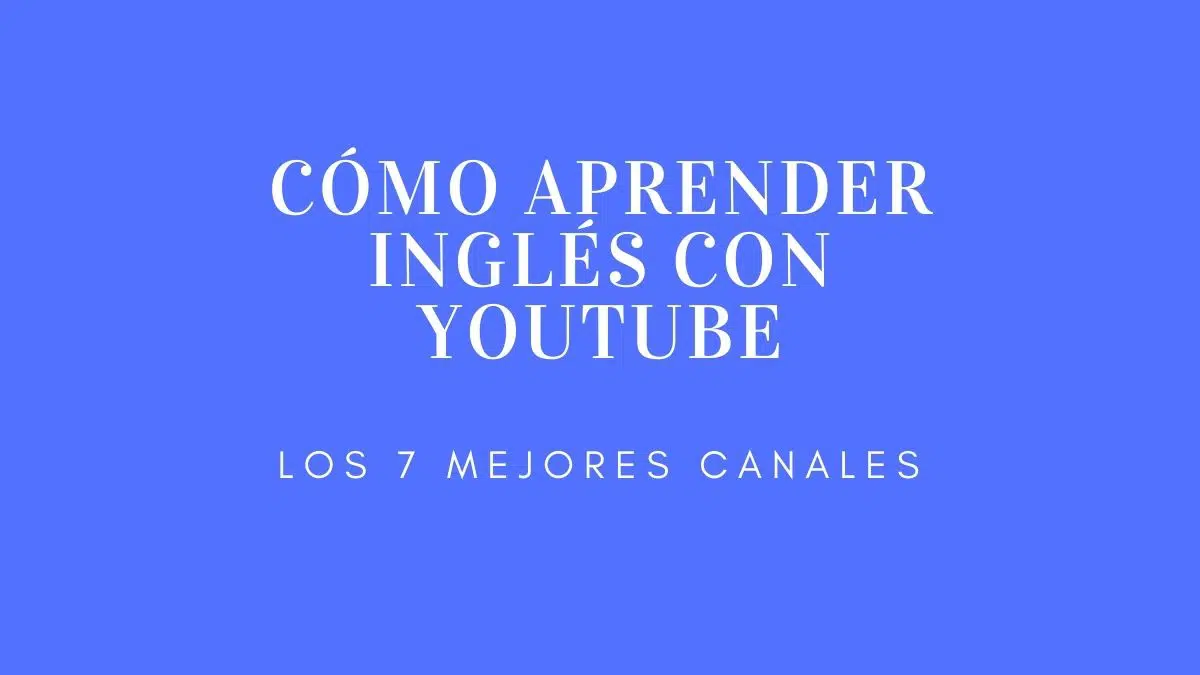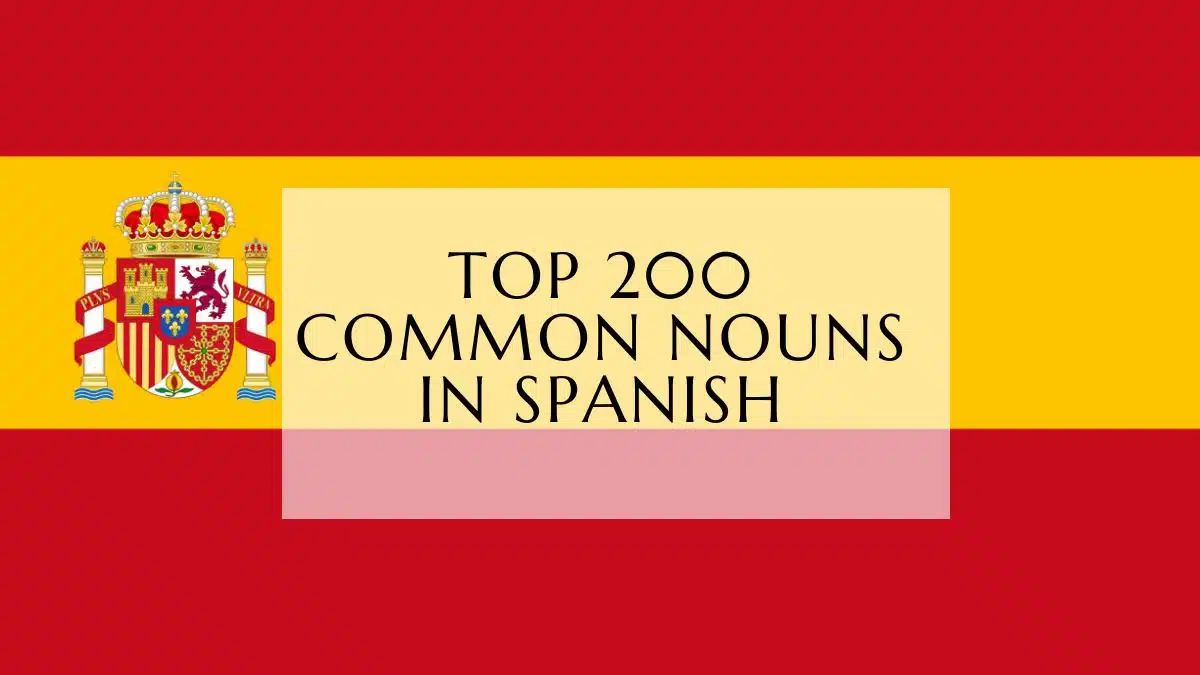The preterite imperfect tense in Spanish (Pretérito Imperfecto) is used to talk about past habits that was usual in a period of time in the past, and to describe people, things or places in the past.
In this lesson, we will talk about the use and difference between the Pretérito Indefinido and the Pretérito Imperfecto, and conjugation of each verb type (-ar, -er and -ir) then give some examples.
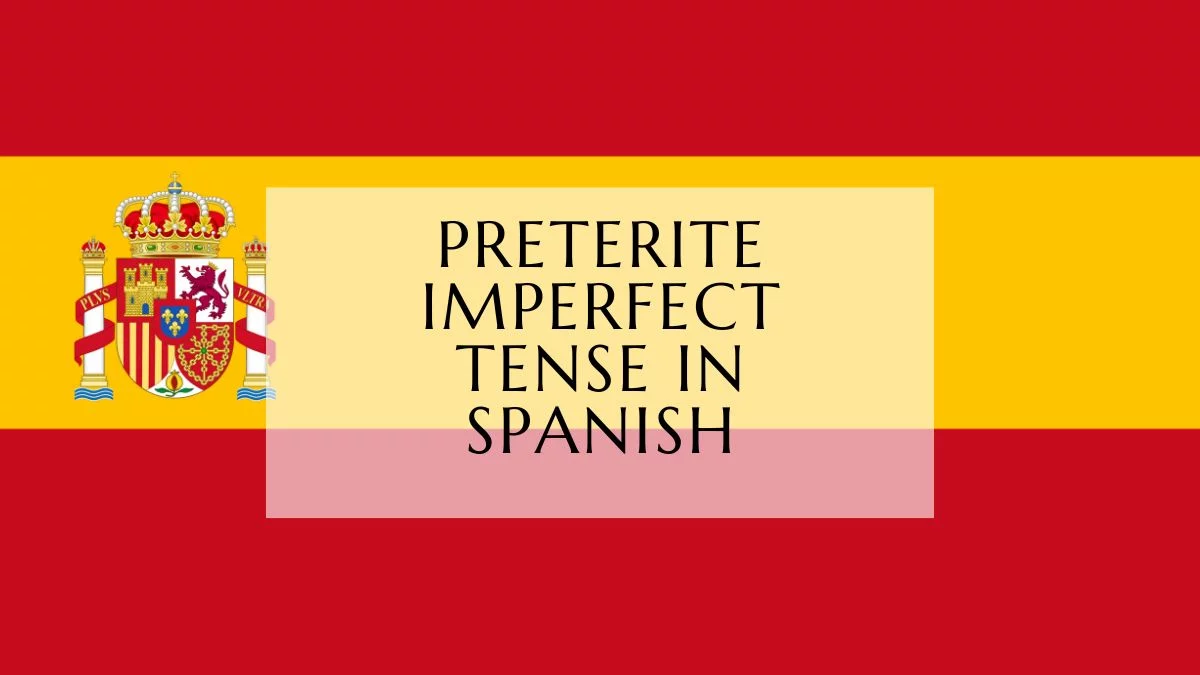
Preterite Imperfect Tense In Spanish
We use the “pretérito imperfecto” to talk about past habits:
Tomaba café todos los días: I used to drink coffee every day
And to describe people or things in the past:
Tenía el pelo largo cuando era niño: I had long hair when i was a kid
For regular verbs, they follow the following patterns:
Verbs that end with -ar
| Yo | -aba |
| Tú | -abas |
| Él/ ella | -aba |
| Usted | -aba |
| Nosotros / Nosotras | -ábamos |
| Vosotros / Vosotras | -abais |
| Ellos / Ellas | -aban |
| Ustedes | -aban |
Example: Estudiar (to study):
| Yo | estudiaba |
| Tú | estudiabas |
| Él/ ella | estudiaba |
| Usted | estudiaba |
| Nosotros / Nosotras | estudiábamos |
| Vosotros / Vosotras | estudiabais |
| Ellos / Ellas | estudiaban |
| Ustedes | estudiaban |
Example: Hablar (to speak)
| Yo | hablaba |
| Tú | hablabas |
| Él/ ella | hablaba |
| Usted | hablaba |
| Nosotros / Nosotras | hablábamos |
| Vosotros / Vosotras | hablabais |
| Ellos / Ellas | hablaban |
| Ustedes | hablaban |
Note: you can practice what you’ve learned here, and learn how to pronounce each of the words in our Memrise course here, don’t know how to use the platform or sign up? we’ve got you covered in this easy-to-follow tutorial here.
Verbs that end with -er and -ir
Both regular verbs with -er and -ir endings follow this rule:
| Yo | -ía |
| Tú | -ías |
| Él/ ella | -ía |
| Usted | -ía |
| Nosotros / Nosotras | -íamos |
| Vosotros / Vosotras | -íais |
| Ellos / Ellas | -ían |
| Ustedes | -ían |
Example: aprender (to learn)
| Yo | aprendía |
| Tú | aprendías |
| Él/ ella | aprendía |
| Usted | aprendía |
| Nosotros / Nosotras | aprendíamos |
| Vosotros / Vosotras | aprendíais |
| Ellos / Ellas | aprendían |
| Ustedes | aprendían |
Example: comer (to eat)
| Yo | comía |
| Tú | comías |
| Él/ ella | comía |
| Usted | comía |
| Nosotros / Nosotras | comíamos |
| Vosotros / Vosotras | comíais |
| Ellos / Ellas | comían |
| Ustedes | comían |
Example: decidir (to decide)
| Yo | decidía |
| Tú | decidías |
| Él/ ella | decidía |
| Usted | decidía |
| Nosotros / Nosotras | decidíamos |
| Vosotros / Vosotras | decidíais |
| Ellos / Ellas | decidían |
| Ustedes | decidían |
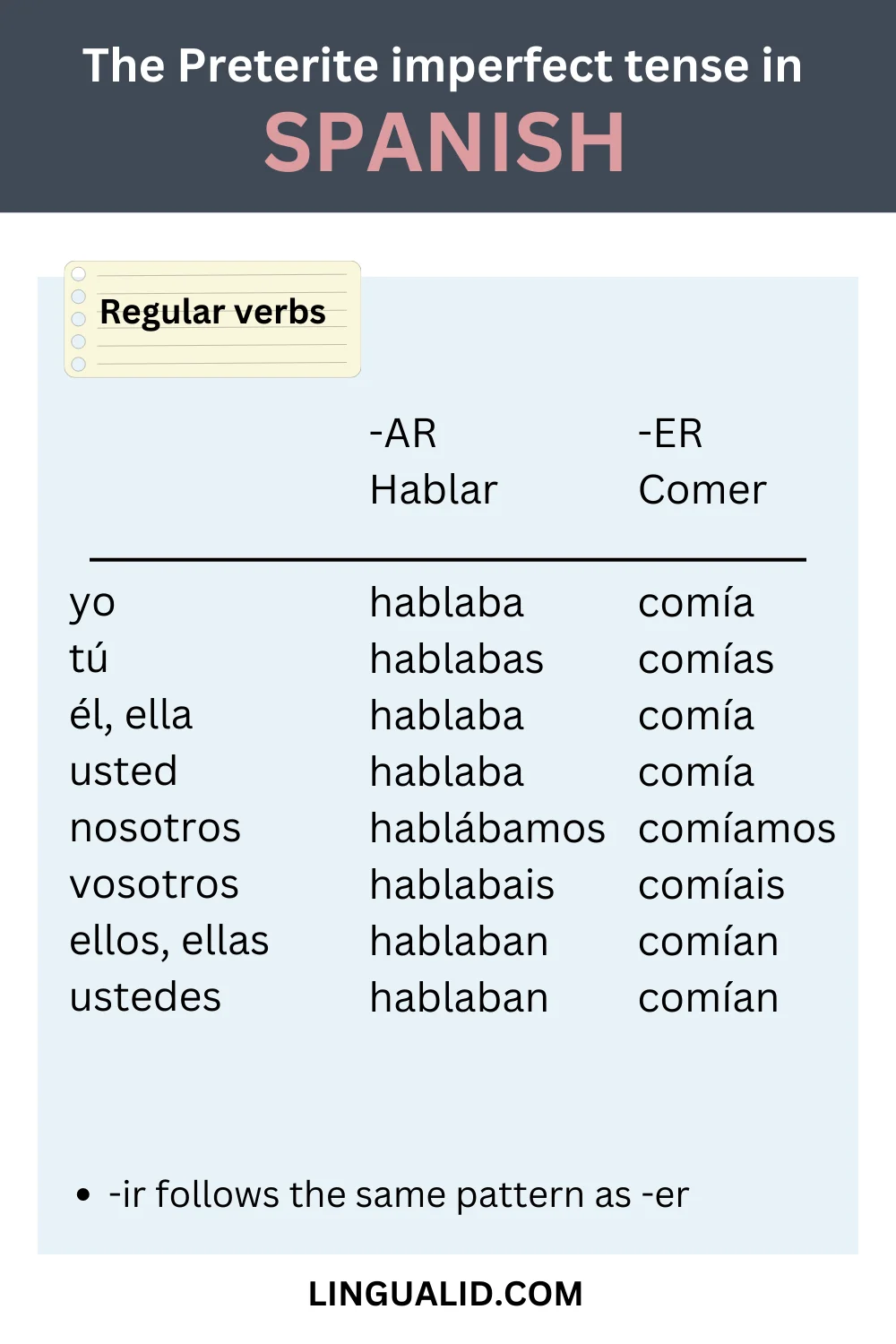
Some irregular verbs
Ser (to be):
| Yo | era |
| Tú | eras |
| Él/ ella | era |
| Usted | era |
| Nosotros / Nosotras | éramos |
| Vosotros / Vosotras | erais |
| Ellos / Ellas | eran |
| Ustedes | eran |
Ir (to go):
| Yo | iba |
| Tú | ibas |
| Él/ ella | iba |
| Usted | iba |
| Nosotros / Nosotras | íbamos |
| Vosotros / Vosotras | ibais |
| Ellos / Ellas | iban |
| Ustedes | iban |
Ver (to see):
| Yo | veía |
| Tú | veías |
| Él/ ella | veía |
| Usted | veía |
| Nosotros / Nosotras | veíamos |
| Vosotros / Vosotras | veíais |
| Ellos / Ellas | veían |
| Ustedes | veían |
Pretérito Indefinido Vs Pretérito Imperfecto In Spanish
We use “pretérito indefinido” to talk about specific events that have finished in the past, while we use the “pretérito imperfecto” to describe people, habits and things in the past
Related: Pretérito indefinido in Spanish (the preterite tense)
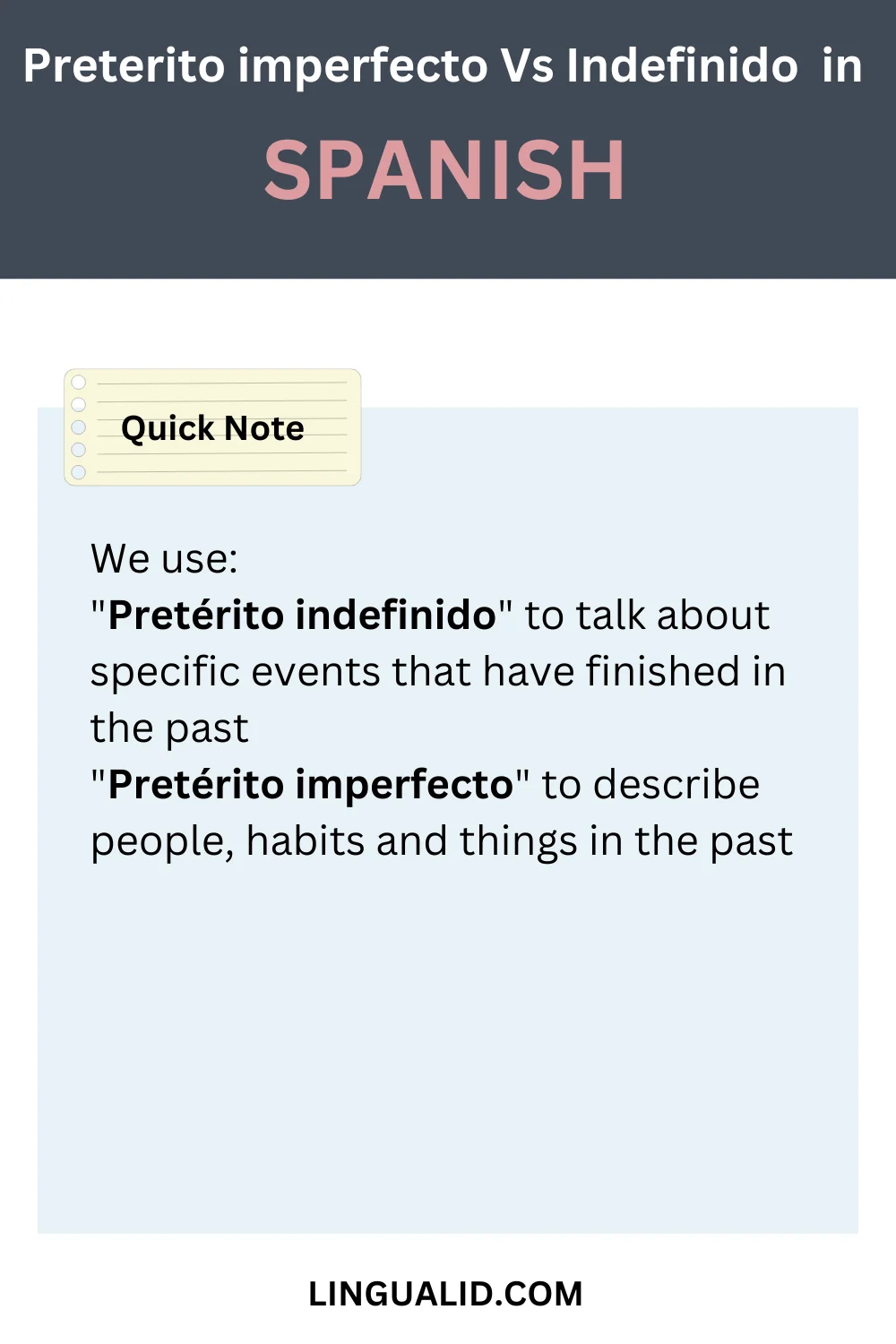
Review
Quiz
Instructions: Answer the following questions in 2-3 sentences.
- What are the two primary uses of the preterite imperfect tense in Spanish? Provide an example for each use in Spanish and English.
- How do you conjugate regular -ar verbs in the preterite imperfect tense? Provide the conjugation for “hablar” (to speak).
- What is the conjugation pattern for regular -er and -ir verbs in the preterite imperfect tense? Use “aprender” (to learn) as an example.
- List three irregular verbs in Spanish and provide their preterite imperfect conjugations for the first-person singular (yo) form.
- Explain the difference between “Pretérito Indefinido” and “Pretérito Imperfecto” in Spanish. Provide an example sentence for each tense.
- Translate the following sentence into Spanish using the preterite imperfect tense: “I used to eat breakfast at 8:00 am.”
- Translate the following sentence into Spanish using the preterite imperfect tense: “They were very happy when they lived in Spain.”
- How would you ask someone in Spanish what they used to do every day in the past?
- You want to tell a story about your childhood in Spanish. Which tense would you primarily use and why?
Short Answer Key
- The two primary uses of the preterite imperfect are:
- To describe past habits or routines: Example: “Yo comía cereal todas las mañanas.” (I used to eat cereal every morning.)
- To describe people, things, or situations in the past: Example: “Ella era alta y rubia.” (She was tall and blond.)
- Regular -ar verbs in the preterite imperfect are conjugated by dropping the -ar and adding the following endings: -aba, -abas, -aba, -ábamos, -abais, -aban. Hablar (to speak): Yo hablaba, tú hablabas, él/ella/usted hablaba, nosotros/as hablábamos, vosotros/as hablabais, ellos/ellas/ustedes hablaban.
- Regular -er and -ir verbs in the preterite imperfect share the same conjugation pattern. Drop the -er/-ir ending and add: -ía, -ías, -ía, -íamos, -íais, -ían. Aprender (to learn): Yo aprendía, tú aprendías, él/ella/usted aprendía, nosotros/as aprendíamos, vosotros/as aprendíais, ellos/ellas/ustedes aprendían.
- Three irregular verbs in the preterite imperfect (yo form):
- Ser (to be): Yo era
- Ir (to go): Yo iba
- Ver (to see): Yo veía
- Pretérito Indefinido: Used for completed actions in the past. Example: “Ayer comí pizza.” (Yesterday, I ate pizza.) Pretérito Imperfecto: Used for ongoing or habitual actions in the past, and descriptions. Example: “Siempre comía pizza los viernes.” (I always used to eat pizza on Fridays.)
- “Yo desayunaba a las ocho de la mañana.”
- “Ellos eran muy felices cuando vivían en España.”
- “¿Qué hacías todos los días (en el pasado)?”
- The preterite imperfect tense would be used primarily to describe what life was like in your childhood, your routines, and to set the scene. This is because the imperfect focuses on ongoing actions and descriptions in the past.
Happy learning!
Oualid Cheddadi is a language enthusiast who created Lingualid with the mission to inspire independent language learners worldwide, regardless of the language they are learning. The name “Lingualid” is derived from the Portuguese word for “language,” “língua,” and the last three letters of Oualid’s name, “Lid.”


